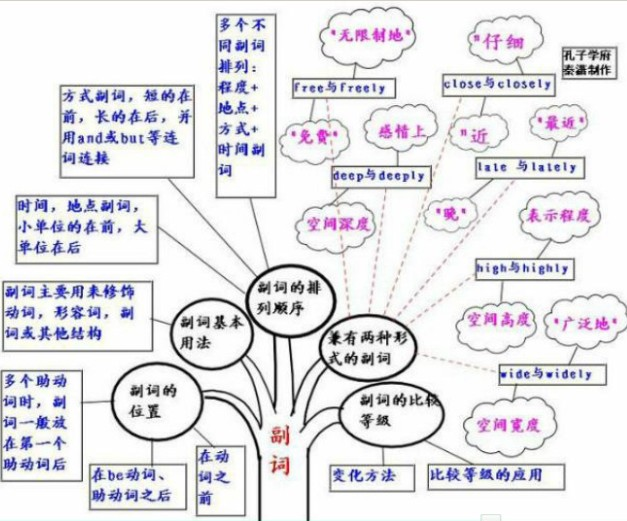本试题 “We mustn't take _____. We'd better play _____.[ ]A. chance; safeB. chances; safeC. a chance; safetyD. a chance; safely” 主要考查您对可数名词及其单复数
副词
等考点的理解。关于这些考点您可以点击下面的选项卡查看详细档案。
- 可数名词及其单复数
- 副词
可数名词:
是指能以数目来计算,可以分成个体的人或东西;因此它有复数形式,当它的复数形式在句子中作主语时,句子的谓语也应用复数形式。
可数名词复数的规则变化:
| 情况 | 构成方法 | 读音 | 例词 |
| 一般情况 | 加 –s | 1.清辅音后读/s/; 2.浊辅音和元音后读/z/; |
map-maps bag-bags car-cars |
| 以s,sh,ch,x等结尾的词 | 加 -es | 读 /iz/ | bus-buses watch-watches |
| 以ce,se,ze,(d)ge等结尾 的词 |
加 -s | 读 /iz/ | license-licenses |
| 以辅音字母+y结尾的词 | 变y 为i再加es | 读 /z/ | baby-babies |
1)以y 结尾的专有名词,或元音字母+y结尾的名词变复数时,直接加s变复数:
如:two Marys the Henrys monkey---monkeys holiday---holidays
比较:层楼:storey---storeys story---stories
2)以o 结尾的名词,变复数时:
a. 加s,如: photo---photos piano---pianos
b. 加es,如:potato--potatoes tomato--tomatoes
c. 均可,如:zero---zeros / zeroes
3)以f或fe 结尾的名词变复数时:
a. 加s,如: belief---beliefs roof---roofs safe---safes gulf---gulfs;
b. 去f, fe 加ves,如:half---halves knife---knives leaf---leaves wolf---wolves wife---wives life---lives thief---thieves;
c. 均可,如:handkerchief: handkerchiefs / handkerchieves
可数名词复数的不规则变化:
1)child---children foot---feet tooth---teeth mouse---mice man---men woman---women
注意:与 man 和 woman构成的合成词,其复数形式也是 -men 和-women。
如:an Englishman,two Englishmen. 但German不是合成词,故复数形式为Germans;Bowman是姓,其复数是the Bowmans。
2)单复同形 如:
deer,sheep,fish,Chinese,Japanese
li,jin,yuan,two li,three mu,four jin
但除人民币元、角、分外,美元、英镑、法郎等都有复数形式。如:
a dollar, two dollars; a meter, two meters
3)集体名词,以单数形式出现,但实为复数。
如:staff people police cattle 等本身就是复数,不能说a staff a people,a police,a cattle,
但可以说a person,a policeman,a head of cattle, the English,the British,the French,the Chinese,the
Japanese, the Swiss 等名词,表示国民总称时,作复数用。
如:The Chinese are industries and brave. 中国人民是勤劳勇敢的。
4)以s 结尾,仍为单数的名词,如:
a. maths,politics,physics等学科名词,为不可数名词,是单数。
b. news 是不可数名词。
c. the United States,the United Nations 应视为单数。
The United Nations was organized in 1945. 联合国是1945年组建起来的。
d. 以复数形式出现的书名,剧名,报纸,杂志名,也可视为单数。
"The Arabian Nights" is a very interesting story-book.
<<一千零一夜>>是一本非常有趣的故事书。
5) 表示由两部分构成的东西,如:glasses (眼镜) trousers, clothes ;
若表达具体数目,要借助数量词 pair(对,双); suit(套); a pair of glasses; two pairs of trousers
6)另外还有一些名词,其复数形式有时可表示特别意思,如:goods货物,waters水域,fishes(各种)鱼
复合名词的复数形式:
名词作定语名词作定语一般用单数,但也有以下例外。
1)用复数作定语。
如:sports meeting 运动会
students reading-room 学生阅览室
talks table 谈判桌
the foreign languages department 外语系
2)man, woman, gentleman等作定语时,其单复数以所修饰的名词的单复数而定。
如:men workers
women teachers
gentlemen officials
3)有些原有s结尾的名词,作定语时,s保留。
如:goods train (货车)
arms produce 武器生产
customs papers 海关文件
clothes brush衣刷
4)数词+名词作定语时,这个名词一般保留单数形式。
如:two-dozen eggs 两打/(二十四个鸡蛋)
a ten-mile walk 十里路
two-hundred trees 两百棵树
a five-year plan 一个五年计划
可数名词单复数知识体系:

不同国籍人的单复数:
国籍
总称(谓语用复数)
单数
复数
中国人
the Chinese
a Chinese
two Chinese
瑞士人
the Swiss
a Swiss
two Swiss
澳大利亚人
the Australians
an Australian
two Australians
俄国人
the Russians
a Russian
two Russians
意大利人
the Italians
an Italian
two Italians
希腊人
the Greek
a Greek
two Greeks
法国人
the French
a Frenchman
two Frenchmen
日本人
the Japanese
a Japanese
two Japanese
美国人
the Americans
an American
two Americans
印度人
the Indians
an Indian
two Indians
加拿大人
the Canadians
a Canadian
two Canadians
德国人
the Germans
a German
two Germans
英国人
the English
an Englishman
two Englishmen
瑞典人
the Swedish
a Swede
two Swedes
副词的概念:
副词是指在句子中表示行为或状态特征的词,用来修饰动词、形容词、其他副词、介词短语、非谓语动词乃至整个句子,表示时间、地点、程度、方式等概念。
副词的位置:
1)在动词之前。
2)在be动词、助动词之后。
3)多个助动词时,副词一般放在第一个助动词后。
注意:
a. 大多数方式副词位于句尾,但宾语过长,副词可以提前,以使句子平衡。
如:We could see very clearly a strange light ahead of us.
b. 方式副词well,badly糟、坏,hard等只放在句尾。
如:He speaks English well.
副词的排列顺序:
1)时间,地点副词,小单位的在前,大单位在后。
2)方式副词,短的在前,长的在后,并用and或but等连词连接。
如:Please write slowly and carefully.
3)多个不同副词排列:程度+地点+方式+时间副词。
注意:副词very可以修饰形容词,但不能修饰动词。
改错:(错)I very like English.
(对)I like English very much.
注意:副词enough要放在形容词的后面,形容词enough放在名词前后都可。
如:I don't know him well enough.
There is enough food for everyone to eat.
There is food enough for everyone to eat.
兼有两种形式的副词:
1)close与closely:
close意思是“近”;closely意思是“仔细地”。
如: He is sitting close to me.
Watch him closely.
2)late与lately:
late意思是"晚";lately意思是“最近” 。
如:You have come too late.
What have you been doing lately?
3)deep与deeply:
deep意思是“深”,表示空间深度;deeply时常表示感情上的深度,“深深地” 。
如:He pushed the stick deep into the mud.
Even father was deeply moved by the film.
4)high与highly:
high表示空间高度;highly表示程度,相当于much。
如:The plane was flying high.
I think highly of your opinion.
5)wide与widely:
wide表示空间宽度;widely意思是“广泛地”,“在许多地方”。
如:He opened the door wide.
English is widely used in the world.
6)free与freely:
free的意思是“免费”;freely的意思是“无限制地”。
如:You can eat free in my restaurant whenever you like.
You may speak freely, say what you like.
副词知识体系:

与“We mustn't take _____. We'd better play _____.[ ]A. chanc...”考查相似的试题有:
- It is said that dogs will keep you _________for as long as you want when you are feeling lonely.A.safetyB.companyC...
- –Do you like this flat?--Not a little. We can’t have ____.A a worse one B a nicer one C such a bad one D so nice one
- Suddenly the idea came to me ____ I might turn to Mr.Smith for help.A.whatB.thatC.whichD.whom
- According to the recent survey, cancer is the leading cause of death among young adults in this area, ____woman.[ ]A....
- ---The boy looks ____.---I know.He failed the exam, and now he is looking_____at his father.A.sad;sadB.sad;sadlyC....
- 短文改错。I am good at all the subjects,and always ready help others.At school I get along wellwith my classmates.Th...
- She was not______ frightened; in fact, she was nearly frightened to death. A.a bitB.a littleC.at allD.much
- —Have you finished your experiment report, Jane?—Oh, my God. I’ve _____ forgotten all about that.A.stronglyB.really...
- I might fail, but _______ I insist on doing it. I don’t mind what the result will be.A.howeverB.anyhowC.thoughD.m...
- With the help of the new equipment, our factory produced _____ VCD players in 2009 as the year before.[ ]A. as many a...